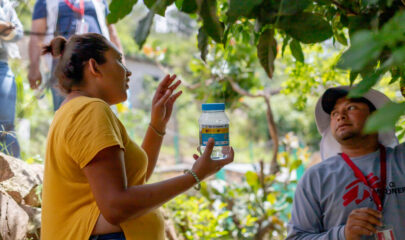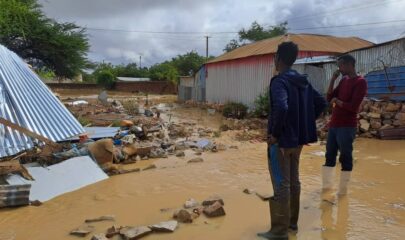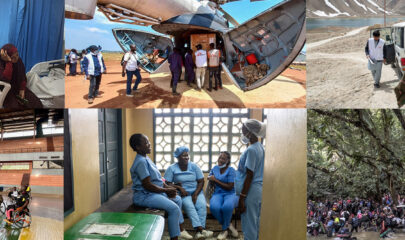PEOPLE RESCUED BY MSF SHIP TALK ABOUT THE VIOLENCE THEY HAVE EXPERIENCED AND WITNESSED
In December 2021, the Doctors Without Borders/Médecins Sans Frontières (MSF) search and rescue vessel Geo Barents saved 558 people across eight rescues of boats in distresson on the Mediterranean Sea.
Many of these people had not only sur- vived the sea, but also severe violence and trauma – inflicted in Libya, from where they had fled; in their countries of origin; and during their journeys.
Several people arrived on board with physical injuries that were visibly fresh, including fractured bones. These types of injuries require critical pain management, which can be challenging in the crowded environment of the ship.
Most told MSF medical teams their injuries had been sustained just before or during the time they were leaving the Libyan coast. Others had older wounds. Some people said their injuries were inflicted in Libya by detention centre guards and non- state armed groups, while others reported they occurred at the hands of the Libyan Coast Guard during interceptions at sea.
“I suffered a lot in Libya,” says Aissatou*, a 21-year-old woman from Cameroon. “When I entered Libya, I didn’t have any scars. Now, my whole body is covered in scars.”
Aissatou has a large scar on her chest, a reminder of being stabbed as she escaped from a prison in Libya.
“It was a women’s prison, so the guards were always raping the girls. They did not feed us well. We did not have clothes; we lived in the dirt. Whenev- er we tried to escape, they called the [gangs] to come and whip us… they beat us with their Kalashnikovs.”
One day, several of the women, including Aissatou, managed to run out of the prison.
“When [the guards] saw that the girls were escaping, they took everything they could – iron [bars], weapons – to hit us. This is when a guard stabbed me in the chest. He stabbed me with a metal pipe,” she says. “Many girls were injured, but we ran any- way. My clothes were damp with blood. I asked people in the street to hide me.”
Another man speaks of the violence he experienced in Abu Issa detention centre in Zawiyah, roughly 50 kilometres from Tripo- li, where he was held for over a year.
“They would beat us every morning… sometimes they hit you with their guns, [or] wooden or metal pipes; electricity; ev- erything. I suffered from a lot of injuries.”
“People told us about being beaten or stabbed, with wooden or metal sticks,” says MSF medical team leader Stefanie Hofstetter aboard the Geo Barents. “Others reported being beaten with guns. We also saw people with smaller wounds all over their bodies: when we asked about these wounds, they usually said that they’d been burnt with hot water or melted plastic poured onto the skin.”
Hofstetter says medical teams on search and rescue ships on the Mediterranean Sea have been treating rescued people with these types of injuries for years. “The situation has not changed: the vio- lence is always occurring,” she says. “The only thing that changes is how the violence is inflicted upon people.”
ENDURING HORROR IN SILENCE
Several survivors rescued by the Geo Barents in December 2021 disclosed experiencing or witnessing sexual violence – both in Libya and in their countries of origin – including transactional sex, forced prostitution, rape, forced marriage, trafficking and female gen- ital mutilation. Many had experienced this abuse over a long period of time.

He shared his art with the MSF team to express his gratitude and raise awareness about the abuses people face.
Mediterranean Sea, 2021. © Eloise Liddy/MSF
Aissatou was among those who experienced sexual violence while being held by traffick- ers in large warehouses near the sea, before entering the boats leaving Libya.
“The smugglers, they rape us in the campo (warehouses). If you refuse, they will put the blade on you… you have no choice.”
Ahmed*, 17, from a sub-Saharan African country, witnessed rape while in prison in Libya.
“A lot of people suffer… for women it is hard,” says Ahmed. “Libyan men will take a woman [from the prison]; she will come back sick, with no medical assistance.”
Ahmed says that in Libya, it was impossible for survivors to report these horrific experi- ences or ask for help for fear of retaliation.
“If you speak, they kill you or [the woman].”
Aissatou agrees: “We suffered many things, but we did not speak [in Libya]. Who would we complain to? There is no law. You can only pray to God that if you go in the water, someone will save you.”
THE OPPORTUNITY TO SPEAK
For survivors who have experienced long periods of fear and stress associated with severe violence, the MSF medical team on the Geo Barents focuses on basic mental health support that begins to provide a sense of safety and dignity.
MSF psychologist Hager Saadallah says the opportunity for survivors to speak with a medical professional and have their experiences acknowledged is often one of the most significant things the team can offer.

After eight rescues there are 558 survivors on board the Geo Barents.
Mediterranean Sea, 2021. © Eloise Liddy/MSF
“What people need at this point, as they are still on the move, is to simply have the possibility to speak about what they have been through,” she says.
Geo Barents midwife Kira Smith says this opportunity is especially important for those who have experienced sexual violence.
“Often, when I speak with one of the sur- vivors, it’s the first time they’re talking to anyone – especially a professional – about what happened to them,” says Smith. “I aim to make them feel safe and valued, and to let them know that it’s not their fault. That sets the foundations for what they should expect and feel they deserve from care providers down the track.”
“While there’s a lot we can’t do for people in their short time on the ship, they deserve to be heard and to be treated with dignity.”
*Nameschangedtoprotectprivacy.
MSF has been running search and rescue activities on the Mediterranean Sea since 2015, working on eight different vessels (alone or in partnership with other nongovernmental organizations). Our teams have saved more than 80,000 lives. Since launching search and rescue operations on board the Geo Barents in May 2021, MSF has rescued 1,903 people and recovered the bodies of 10 who died.
Between Dec. 17 and 24, 2021, MSF teams on board the Geo Barents rescued 558 people from boats in distress in eight rescue operations in the Libyan and Maltese search and rescue regions. Among the survivors, 35 were women, two of them pregnant and 174 were minors, of whom 143 were unaccompanied.


